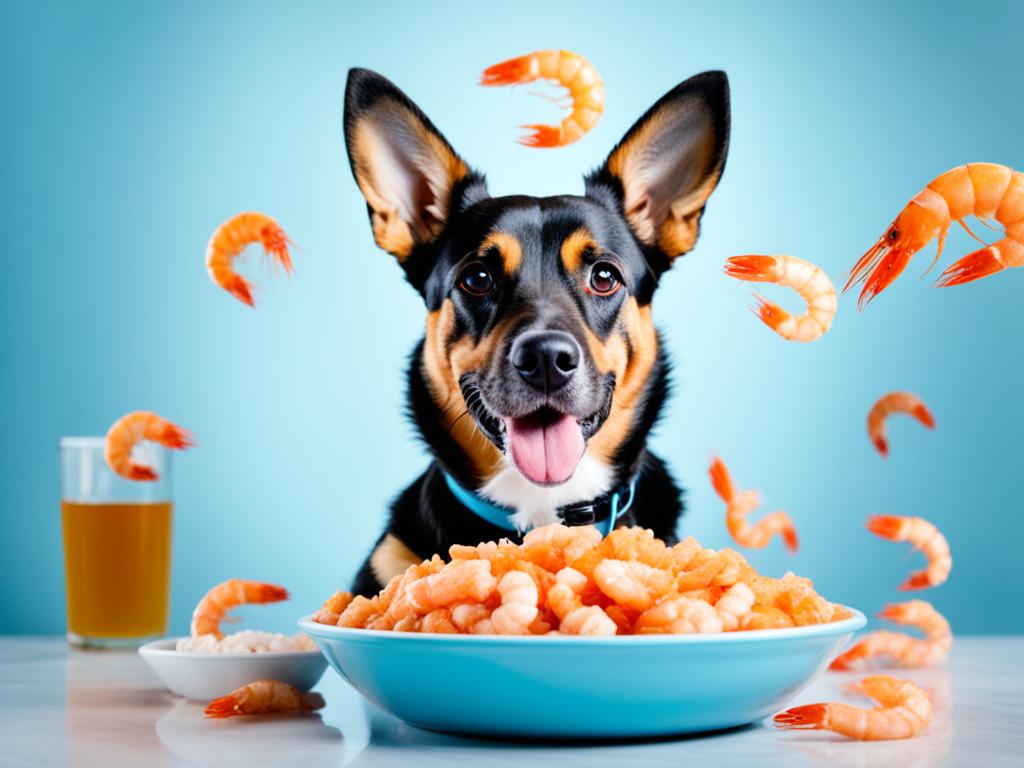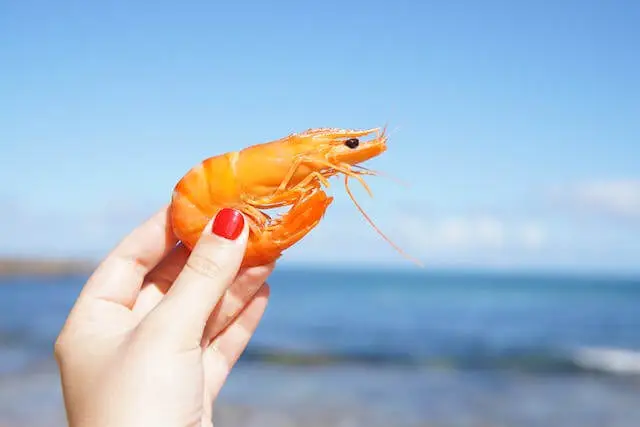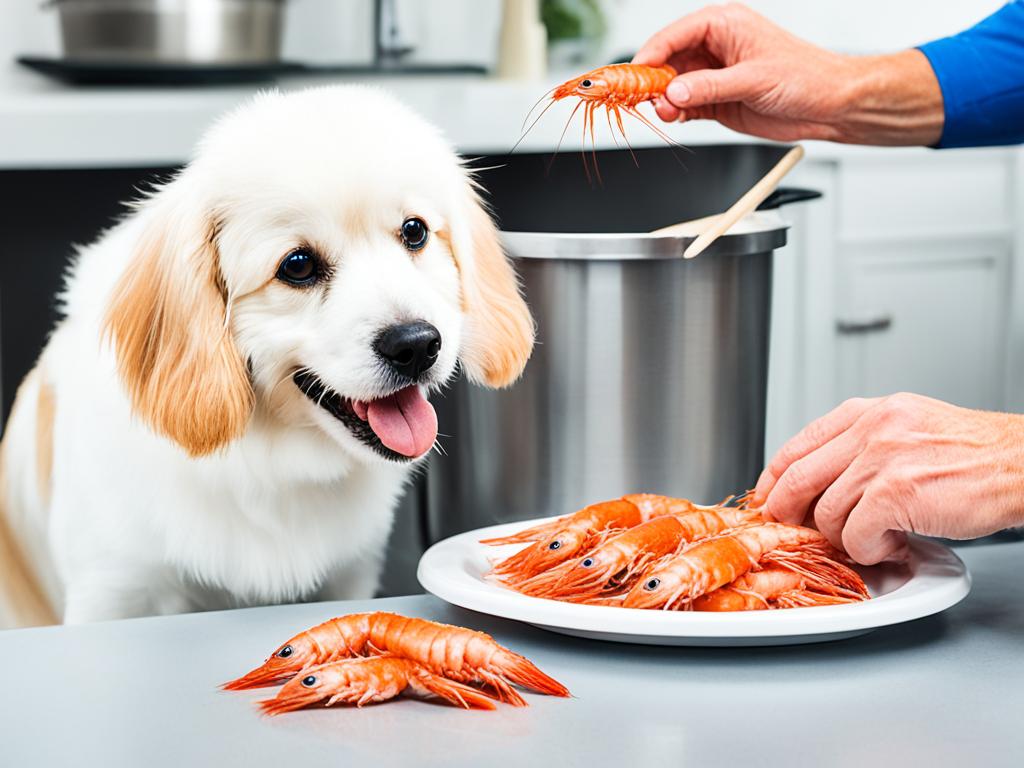Have you ever wished your furry friend joined you for a shrimp feast? You’re not alone! Many dog owners wonder if this tasty treat is safe for their furry friends. So, spill the beans: can dogs eat shrimp?
The answer is tricky. It’s not a straight “yes” or “no.” Although eating some cooked shrimp is safe for dogs, we need to be careful about how we feed them. Ensure it’s cooked and shell-less to avoid tummy troubles. So, before you share your next plate of shrimp, let’s understand the dos and don’ts of shrimpy treats for your dog.
Key Takeaways:
- Shrimp can be a safe dog treat when properly prepared and served in moderation.
- Shrimp is a good source of protein and essential nutrients for dogs.
- It’s crucial to remove the tails and shells before feeding shrimp to dogs.
- Raw shrimp should be avoided due to the risk of bacteria and choking or digestive injury.
- Monitor for allergic reactions or adverse health effects when introducing shrimp to your dog’s diet.

Is Shrimp Good for Dogs?
Shrimp can be a healthy snack for dogs due to its nutrient content, including Vitamin B12, niacin, phosphorus, potassium, magnesium, iodine, antioxidants, and fatty acids. While dogs can eat shrimp, it should be an occasional treat rather than a regular portion of their diet. It can be beneficial as a low-calorie, low-fat alternative to unhealthy treats or human foods. However, it has high cholesterol, suggesting excessive consumption may lead to unwanted cholesterol levels.

Nutritional Value of Shrimp for Dogs
When providing a well-rounded diet for your dog, it’s essential to consider the nutritional value of the foods you’re feeding them. Shrimp, a protein-rich seafood, offers a range of vital nutrients that can contribute to your dog’s overall health and well-being.
Shrimp is known for its high protein content, making it an excellent source of this essential macronutrient for dogs. Protein is crucial in building and repairing tissues, supporting muscle growth, and maintaining a healthy immune system. By incorporating shrimp into your dog’s diet, you can help ensure they receive adequate protein.
In addition to protein, shrimp contains various vitamins and minerals that are beneficial for dogs. These include:
- Vitamin B12: Shrimp is a rich source of vitamin B12, which supports the healthy functioning of your dog’s nervous system.
- Niacin: Also known as vitamin B3, niacin aids energy production and promotes proper dog circulation.
- Phosphorus: Shrimp contains phosphorus, contributing to healthy bone formation and maintenance.
- Antioxidants: Shrimp provides antioxidants that help protect your dog’s cells from damage caused by harmful molecules known as free radicals.
By incorporating shrimp into your dog’s diet, you can help provide these essential nutrients that contribute to its overall well-being. Remember that each dog has unique nutritional needs, so you should consult your veterinarian to determine the appropriate amount of shrimp or any other food to include.
Shrimp offers a protein-rich seafood option for dogs, providing essential nutrients such as vitamin B12, niacin, phosphorus, and antioxidants. These nutrients play vital roles in your dog’s overall health, including the functioning of their nervous system, energy production, bone health, and cell protection.

Can Dogs Eat Raw Shrimp?
Are you thinking about giving your dog raw shrimp? Well, you should reconsider. Raw shrimp contains pathogens harmful to their health. Raw shrimp consumption can result in symptoms like diarrhea, vomiting, nausea, and abdominal pain in both dogs and humans. Always cook shrimp for your dog to ensure safety and eliminate bacteria and pathogens.
Can Dogs Have Cooked Shrimp?
The safest choice for dogs is cooked shrimp to eliminate harmful pathogens that can make them sick. Remember, only give them plain, unseasoned shrimp – seasonings can be bad for pets. Garlic and onion are often used to add flavor and are toxic to pets. Even too much salt, which seems harmless, can make your pet thirsty and dehydrated. If your dog accidentally consumes a lot of seasoned shrimp, contact your vet immediately.

Can Dogs Eat Shrimp Shells and Tails?
Shrimp shells and tails can be dangerous for dogs. They might choke on them because they are brittle and sharp. Even if the shells or tails are cooked, they’re hard to digest and can cause problems in the stomach or intestines. If your dog eats a shrimp shell or tail, watch them closely. Call your vet immediately if they act strange or seem in pain. Ideally, removing the shells and tails is safe before giving your dog shrimp.
How Much Shrimp Is Safe for Dogs?
Limit yummy treats like shrimp to 10% of your dog’s diet; the remaining 90% should be well-balanced dog food. Refer to the guidelines below for appropriate shrimp portions based on your dog’s size and breed.
| Dog Size | Shrimp Portion | Dog Breed |
| Extra-small dog (2-20 lbs) | 1/2 medium shrimp | Yorkies Chihuahuas Pomeranians Pugs Shih Tzus |
| Small dog (21-30 lbs) | 1 medium shrimp | Basenjis Beagles Miniature Australian Shepherds |
| Medium dog (31-50 lbs) | 2 medium shrimp | Basset Hounds Border Collies Australian Cattle Dogs Siberian Huskies |
| Large dog (51-90 lbs) | 3 medium shrimp | Pit Bulls German Shepherds Labrador Retrievers Australian Shepherds |
| Extra-large dog | Up to 4 medium shrimp | Newfoundlands Bernese Mountain Dogs St. Bernards Great Pyrenees |
Risks and Precautions of Feeding Shrimp to Dogs
While shrimp can benefit a dog’s diet, specific risks and precautions must be considered. It’s essential to be aware of the potential health risks and take necessary precautions to ensure the well-being of your furry friend.

Bacterial Infections and Parasites in Shrimp
Improperly cooked or raw shrimp can potentially contain harmful bacteria or parasites that can cause health issues in dogs. Bacterial infections, such as Salmonella or E. coli, can lead to symptoms like diarrhea, vomiting, or lethargy.
Additionally, certain types of shrimp may carry parasites, such as roundworms or tapeworms, which can affect a dog’s gastrointestinal system and overall health.
Precautions for Feeding Shrimp to Dogs
To minimize the risks associated with feeding shrimp to dogs, it’s essential to take the following precautions:
- Cook the shrimp: Always cook thoroughly to kill harmful bacteria or parasites. Avoid feeding dogs raw or undercooked shrimp.
- Remove shells and tails: Shrimp shells and tails can pose a choking hazard and may cause digestive issues in dogs. Remove all shells and tails before serving shrimp to your furry companion.
- Monitor for adverse reactions: After consuming shrimp, watch your dog closely for any signs of allergic reactions or digestive problems. If any adverse reactions occur, seek veterinary advice immediately.
Note: Canine-specific symptoms and reactions may vary. Always consult with a veterinarian for personalized guidance.
Risks and Precautions of Feeding Shrimp to Dogs
| Risks | Precautions |
|---|---|
| Potential allergic reactions | Observe for symptoms, consult a vet if needed |
| Bacterial infections | Cook shrimp thoroughly, avoid raw or undercooked shrimp |
| Parasites in shrimp | Ensure proper cooking, remove shells and tails |
What Happens If Dog Eats Excessive Shrimp?
If your dog consumes a lot of shrimp, monitor for signs of an upset stomach. Contact your veterinarian promptly if you observe decreased appetite, fatigue, depressive behavior, discomfort, or excessive licking.
For more severe symptoms, seek immediate veterinary attention if your dog experiences vomiting, excessive diarrhea, the presence of blood in vomit or stool, weakness, or collapse.
Recommendations To Feed Shrimp to Your Dog

When sharing shrimp with your dog, follow these recommendations to ensure their safety and well-being:
- Cook shrimp properly to avoid health risks for both humans and dogs. Raw or undercooked shrimp may contain pathogens, leading to nausea, vomiting, and diarrhea in dogs.
- Ensure the shrimp is cut into small, swallowable pieces to prevent choking. Dogs often swallow without proper chewing, so smaller pieces are safer.
- Don’t add any seasoning to the shrimp for your dog. Prepare their portion separately to avoid potential harm from ingredients like garlic, onion, or excess salt.
- Control the portion size to prevent weight gain and digestive issues. Overeating may result in symptoms like vomiting and diarrhea.
- Always remove the shell and tail before sharing shrimp with your dog. These parts are hard to digest, pose a choking hazard, and can hurt their throat and stomach.
Health Benefits of Shrimp for Dogs
Feeding shrimp to dogs can offer various health benefits:
- Omega-3 Fatty Acids: Shrimp contains omega-3 fatty acids, which support brain health and joint function in dogs.
- Antioxidants: Shrimp is rich in antioxidants, which protect cells from damage and contribute to dogs’ overall well-being.
- Nutrients: Shrimp provides essential nutrients that benefit dogs’ health and vitality.
Risks of Shrimp for Dogs
While shrimp can be beneficial for dogs, it’s essential to be cautious of the following risks:
- Allergic Reactions: Some dogs may have allergic reactions to shrimp, resulting in symptoms such as itching, swelling, or vomiting.
- Bacterial Infections: Improperly prepared or contaminated shrimp can potentially carry harmful bacteria, leading to dog infections.
- Parasites: Shrimp may also harbor parasites that can cause dog health issues if not adequately cooked or sourced.
Sourcing High-Quality Shrimp for Dogs
When feeding shrimp to your dog, it’s crucial to source high-quality seafood from reputable suppliers. Low-quality or improperly handled shrimp may carry harmful bacteria or contaminants that can pose health risks to your canine companion. Look for shrimp that is labeled for human consumption, as these are typically held to higher safety standards.
| Shrimp-Related Safety Concerns | Precautions |
|---|---|
| Choking Hazards | Always remove tails and shells before feeding shrimp to dogs. |
| Sharp Parts | Thoroughly clean shrimp and remove all sharp sections. |
| Shrimp Shells and Digestion | Remove shells to prevent digestive discomfort. |
| Potential Health Issues from Tails | Discard tails to avoid internal injuries or blockages. |
| Sourcing High-Quality Shrimp | Choose shrimp from reputable suppliers for safety. |
Creative Ways to Share Shrimp Treats with Your Dog
Are you curious to know how to add a touch of shrimp delight to your furry friend’s meals? Here are some fantastic ways to treat your dog with shrimp:
- Blend with Regular Food: Incorporate shrimp pieces into your dog’s regular meals.
- Create a Special Mix: Make a delightful treat by combining cooked shrimp with dog-friendly vegetables such as carrots, potatoes, sweet potatoes, peas, green beans, or broccoli.
- Pair with Rice: Mix cut-up, cooked shrimp with plain, boiled rice for a delicious meal. You can even stuff these mixtures into your dog’s toy to provide them with an engaging activity.
Allergic Reactions and Shrimp-Related Health Concerns
While shrimp can benefit a dog’s diet, being aware of potential allergic reactions and shrimp-related health concerns is essential. Some dogs may have sensitivities or allergies to shrimp, which can manifest in various symptoms. If you suspect your dog may have a shrimp allergy, keep an eye out for the following symptoms:
- Itching
- Hives
- Swelling
- Difficulty breathing
- Vomiting
If your dog experiences these symptoms after consuming shrimp, it’s crucial to seek veterinary care immediately. In severe cases, anaphylaxis can occur, which requires prompt medical attention to prevent life-threatening complications.
Remember, every dog is unique, and while some may tolerate shrimp without any issues, others may have adverse reactions. It’s essential to monitor your dog’s response to shrimp and other new foods, introducing them gradually and observing any signs of discomfort or allergic reactions.
Regarding your dog’s health, being safe is better than sorry. If you notice any symptoms of shrimp allergies or other adverse health effects after feeding shrimp to your dog, don’t hesitate to consult with your veterinarian. They can provide expert guidance and ensure the well-being of your furry friend.
Conclusion
Plain, cooked shrimp can be a safe treat for most healthy adult dogs, but moderation is key. Are there exceptions? Indeed, dogs with allergies or weight concerns should avoid this delicious treat. You can boil, bake, or steam the shrimp for the healthiest option and skip the oils and seasonings.
However, before introducing shrimp to your dog’s menu, always check in with your vet—especially if your furry friend has health issues or a sensitive stomach. Here’s to happy, healthy snacking for your furry companion!
Also read a separate guide if you want to offer Eggs , Oranges, Okra , Oranges and potatoes to your dogs.
FAQs
Can dogs eat shrimp?
Yes, dogs can safely eat shrimp when properly prepared and served in moderation.
Is Shrimp Bad for Dogs?
Cooked shrimp is safe for dogs in moderation, offering protein and beneficial nutrients like B12 and antioxidants. Ensure it is well-cooked and served without the shell, veins, and tail to prevent choking and intestinal blockage.
Can Dogs be Allergic to Shrimp?
Yes, dogs can be allergic to shrimp. Look for signs like vomiting, diarrhea, itchiness, facial swelling, or, in rare cases, anaphylaxis. If you think your dog is allergic to shrimp, consult your vet for guidance.
Can Dogs Eat Popcorn Shrimp?
Dogs can eat popcorn shrimp, but it’s not a healthy choice. Popcorn shrimp is fried or breaded, which can be high in fat and calories. For a better option, serve unseasoned steamed or grilled shrimp to dogs without oil or butter.
Can Dogs Eat Shrimp Cocktail?
Dogs can enjoy shrimp cocktails, but be cautious. Ensure the shrimp is fully cooked, deveined, and without the tail to prevent choking or blockages. Skip the sauce, as it might have unsafe ingredients for dogs.
Can dogs eat cooked shrimp?
Yes, cooked shrimp can be a healthy addition to a dog’s diet.
Can dogs eat raw shrimp?
It is not recommended to feed dogs raw shrimp due to potential bacteria and digestive risks.
Can dogs eat coconut shrimp?
It is best to avoid feeding dogs coconut shrimp, as the breading and additional ingredients may not suit them.
Can dogs eat shrimp chips?
It is best to avoid feeding dogs shrimp chips, as they often contain added oils, seasonings, and preservatives that can harm them.
Can dogs have shrimp tails?
Feeding dogs shrimp tails is not recommended as they can pose choking hazards and digestive risks.

